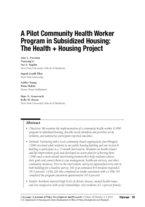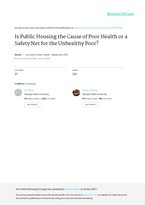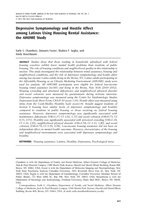0
Research
Community:
Aug 5, 2019
CLPHA developed a general data sharing template that public housing authorities (PHAs) and their health partners can customize to suit their data sharing and collaboration needs. Please feel free to comment to share any uses/modifications your organization made to implement into a partnership.
Authored by:
Topics: Affordable Care Act, CLPHA, Community development, Cost effectiveness, Data sharing, Dental, Depression, Dual-eligibles, Funding, Health, Healthy homes, Legislation & Policy, Low-income, Medicaid / Medicare, Mental health, Metrics, MTW, Nutrition, Obesity, Partnerships, Place-based, Preventative care, Racial inequalities, Research, SAMHSA, Smoke-free, Stability, Substance abuse, Supportive housing, Sustainability, TA
 Shared by Steve Lucas
Shared by Steve Lucas
Steve Lucas posted a
on Aug 5, 2019
Disclaimer: This template is provided for informational purposes only and not for the purpose of providing legal advice. You should contact your attorney to obtain advice with respect to any particular issue or question. Use of this template, including its exhibits and attachments, does not create a relationship or any responsibilities between CLPHA and the user.
CLPHA developed a general data sharing template that public housing authorities (PHAs) and their health partners can customize to suit their data sharing and collaboration needs. Please feel free to comment to share any uses/modifications your organization made to implement into a partnership.
0
Research
Community:
Dec 5, 2018
How does the quality of where we live affect our children’s development? The impact of housing and neighborhood quality on physical health has long been studied in the public health field, but studies that aim to assess those same impacts on mental health are less common. This study examined the relationship between the physical quality of housing and neighborhoods and their interactive effect on the mental health and motivation of children from elementary school through young adulthood.
Authored by: Journal of Environmental Psychology
Topics: Child welfare, Community development, Housing, Low-income, Mental health, Racial inequalities, Research, Youth
 Shared by Mica O'Brien
Shared by Mica O'Brien
Mica O'Brien posted a
on Dec 6, 2018
Journal of Environmental Psychology
How does the quality of where we live affect our children’s development? The impact of housing and neighborhood quality on physical health has long been studied in the public health field, but studies that aim to assess those same impacts on mental health are less common.
0
Research
Community:
Sep 17, 2018
The study finds three out of five adults across the U.S. had at least one adverse experience in their childhood, such as divorce, a parent's death, physical or emotional abuse, or a family member's incarceration or substance abuse problem. A quarter of adults have at least three such experiences in childhood, which – according to other research — increases their risk for most common chronic diseases, from heart disease and cancer to depression and substance abuse.
Authored by: Tara Haelle for NPR
Topics: Child welfare, Depression, Early childhood, Low-income, Mental health, Racial inequalities, Research
 Shared by Mica O'Brien
Shared by Mica O'Brien
Mica O'Brien posted a
on Sep 18, 2018
The study finds three out of five adults across the U.S. had at least one adverse experience in their childhood, such as divorce, a parent's death, physical or emotional abuse, or a family member's incarceration or substance abuse problem.
0
Research
Community:
Aug 1, 2018
Work requirements in public housing are highly controversial, and
little is known about their impacts. We examined how implementation of a work requirement paired with supportive services by Charlotte Housing Authority has impacted residents’ overall well-being. Although the policy might improve well-being
by increasing household income, it might also engender stress through greater housing precarity.
Authored by:
Topics: Depression, Disabilities, Education, Food insecurity, Health, Housing, Low-income, Medicaid / Medicare, Mental health, Metrics, MTW, Partnerships, Racial inequalities, Research, South, Workforce development
 Shared by Housing Is
Shared by Housing Is
Housing Is posted a
on Aug 1, 2018
Work requirements in public housing are highly controversial, and
little is known about their impacts. We examined how implementation of a work requirement paired with supportive services by Charlotte Housing Authority has impacted residents’ overall well-being.
0
Research
Community:
Aug 1, 2018
We examine the implementation of a community health worker (CHW)
program in subsidized housing, describe needs identified and priorities set by residents, and summarize participant-reported outcomes.
Authored by:
Topics: East Coast, Health, Housing, Low-income, Mental health, Metrics, Partnerships, Place-based, Racial inequalities, Research
 Shared by Housing Is
Shared by Housing Is
Housing Is posted a
on Aug 1, 2018
We examine the implementation of a community health worker (CHW)
program in subsidized housing, describe needs identified and priorities set by residents, and summarize participant-reported outcomes.
0
Research
Community:
Jul 27, 2018
The purpose of this paper is to investigate the association between public housing and health conditions: specifically, we ask if residents entered public housing already ill or if public housing may cause the poor health of its residents.
Authored by:
Topics: Health, Housing, Low-income, Mental health, Metrics, Mobility, Nutrition, Racial inequalities, Research, South
 Shared by Housing Is
Shared by Housing Is
Housing Is posted a
on Jul 27, 2018
The purpose of this paper is to investigate the association between public housing and health conditions: specifically, we ask if residents entered public housing already ill or if public housing may cause the poor health of its residents.
0
Research
Community:
Jul 23, 2018
To what extent does a change of address and transformation of the surrounding environment translate into a reduced sense of stigmatization of public housing residents? This article explores this question. Drawing from research at three new, mixed-income developments in Chicago, we examine changes in the regulatory and social environment and the perspectives and experiences of public housing residents living there. We find that although some forms of perceived stigma may have been ameliorated in these new settings, in other ways stigma and isolation has intensified.
Authored by:
Topics: Housing, Low-income, Mental health, Midwest, Mobility, Racial inequalities, Research, Safety
 Shared by Housing Is
Shared by Housing Is
Housing Is posted a
on Jul 23, 2018
To what extent does a change of address and transformation of the surrounding environment translate into a reduced sense of stigmatization of public housing residents? This article explores this question.
0
Research
Community:
Jul 11, 2018
Studies show that those residing in households subsidized with federal housing vouchers exhibit fewer mental health problems than residents of public housing. The role of housing conditions and neighborhood quality in this relationship is unclear. This study investigated the relationship between rental assistance, housing and neighborhood conditions, and the risk of depressive symptomology and hostile affect among low-income Latino adults living in the Bronx, NY
Authored by:
Topics: Depression, East Coast, Health, Housing, Low-income, Mental health, Obesity, Racial inequalities, Research, Stability
 Shared by Housing Is
Shared by Housing Is
Housing Is posted a
on Jul 11, 2018
Studies show that those residing in households subsidized with federal housing vouchers exhibit fewer mental health problems than residents of public housing. The role of housing conditions and neighborhood quality in this relationship is unclear.










